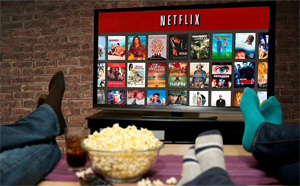 Netflix and Amazon’s video streaming services could be forced to devote “at least” 20 per cent of their catalogues to European films and TV shows as part of an overhaul of the EU’s broadcasting rules.
Netflix and Amazon’s video streaming services could be forced to devote “at least” 20 per cent of their catalogues to European films and TV shows as part of an overhaul of the EU’s broadcasting rules.
Under a Brussels plan to be unveiled next week, video-on-demand groups would also be obliged to “ensure prominence” of any European works, potentially forcing them to replace valuable space on their homepages given to Hollywood blockbusters with French cinema.
Such services are not currently covered by legislation that requires national broadcasters to keep 20 per cent of their content European in order to make sure that viewers are not overwhelmed by US imports
But a draft of the European Commission proposal seen by the Financial Times would put the streaming services, which are dominated by US companies, into the same regulatory regime as broadcasters, obliging them to “contribute financially” to the production of European works in countries where such levies are placed on national broadcasters.
France has led a charge within the EU to allow for cultural exceptions to broadcast and movie regulations, going so far as forcing Brussels to cut audiovisual issues from a trade deal under negotiation with the US.
The new proposals come as part of a wider plan to increase investment in the EU’s television and film industry. Traditional broadcasters invest more heavily than their online peers, according to an EU study. In general, broadcasters such as the BBC invest roughly 20 per cent of their turnover in new productions. For streaming services, this figure drops to barely 1 per cent, the EU found.
Companies such as Netflix have started work on more original European content with mixed success: its recent blockbuster series Marseille, starring Gérard Depardieu as the mayor of the French port, has been panned by critics.
Netflix has warned Brussels that rules requiring a minimum of European content would distort the market and create a “perverse incentive” for operators to buy cheap titles.
“Rigid numerical quotas risk suffocating the market for on-demand audiovisual media services,” Netflix wrote in its response to the commission. “An obligation to carry content to meet a numerical quota may cause new players to struggle to achieve a sustainable business model.”
Likewise, rules on prominence of European content would interfere with the “personalised” approach to providing on-demand video services, according to the video streaming company. “The focus of European audiovisual media policy should be on incentivising the production of European content and not imposing quotas on broadcasters or other?…?providers who would struggle to meet the supply,” Netflix wrote in a submission.
None of the new streaming requirements would apply to “small and micro enterprises”, according to the draft seen by the FT.
The new proposal could also force websites such as YouTube to introduce stronger age barriers for young viewers. While TV channels across Europe tend to have “watersheds” to keep adult content from younger viewers, these rules do not apply to video-on-demand services.
The proposals will be announced as part of a wide range of measures aimed at creating a single, pan-EU market for digital services. As part of the plans, the commission will introduce rules banning so-called “geoblocking” — the tactic whereby companies treat consumers using the same service differently depending on their country of origin.
Netflix declined to comment on Wednesday. Amazon could not be reached.
(Published by Financial Times - May 18, 2016)